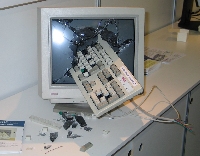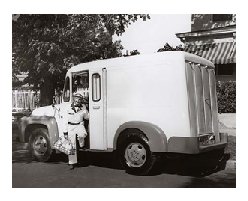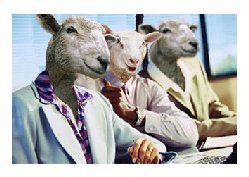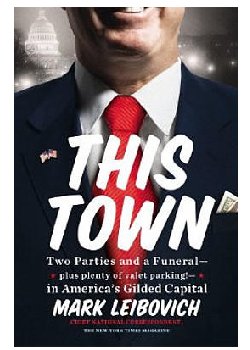- Some simple tips to speed up your machine.
 This narrative is primarily aimed at PC novices, people who have a rudimentary knowledge of how the computer runs and are frustrated as to why it seems to slow down for them. You know the type; people who are prone to cursing at their computer. They are also easy prey to be conned by specialists who want to tune their computers at exorbitant rates. First, understand this, the average life of a computer in business is one year. Home computers though can last a little longer depending on treatment, typically three to five years at most. This is a prime example of "Parkinson's Law" as applied to computer technology.
This narrative is primarily aimed at PC novices, people who have a rudimentary knowledge of how the computer runs and are frustrated as to why it seems to slow down for them. You know the type; people who are prone to cursing at their computer. They are also easy prey to be conned by specialists who want to tune their computers at exorbitant rates. First, understand this, the average life of a computer in business is one year. Home computers though can last a little longer depending on treatment, typically three to five years at most. This is a prime example of "Parkinson's Law" as applied to computer technology.
The biggest problem though is you, the user, who is putting a lot of junk on your computer, both knowingly and unwittingly. If you are downloading software to your computer, either through the Internet or by CD, you are introducing several new files to your computer. If you are accessing the Internet with a web browser, such as MS Internet Explorer, Google Chrome, or Firefox, you are downloading files to your computer. And if you read e-mails from family, friends, or strangers, you are downloading files, all of which are scattered around on the hard drive of your computer. Sometimes vendors secretly place "cookies" on your computer which are files usually used for devilish purposes, such as monitoring what you are looking at on your computer or some other marketing trick. Even worse, spam and bugs may be introduced which is intended to either drive you crazy or hack into your private identity. This is why I'm a big believer of installing security software on the computer as a precursor to doing anything else. If you do not have such software, you are leaving yourself open to attack and theft.
One major rule you should live by: If you do not know the person sending you something on the Internet, DO NOT OPEN IT! If it seems to be too good true, it is! In all likelihood, it is some sort of spam aimed at disrupting your life, stealing your identity or e-mail address book, or setting you up to deposit money into a bank in Nigeria. Just let it go and delete the e-mail and its attachments.
Files are typically scattered around your computer and, despite the speed of your machine, may take time to assemble and load for your use. From time to time it pays to clean this up and, fortunately, there are some basic tools under MS Windows to help you in this regard:
1. Disk Cleanup
Go to Start -> "All Programs" -> "Accessories" -> "System Tools" -> "Disk Cleanup"
This will cleanup several files for you and free up some space. You should run this utility periodically.
Go to Start -> "All Programs" -> "Accessories" -> "System Tools" -> "Disk Cleanup"
This will cleanup several files for you and free up some space. You should run this utility periodically.
Another program, "Disk Defragmenter", is also available:
Go to Start -> "All Programs" -> "Accessories" -> "System Tools" -> "Disk Defragmenter"
However, you will rarely have to use it. Only turn to this utility if you are truly stuck. It will try to correct damaged files as well as reorganizing the hard drive for more efficient use. It typically runs for a long period of time. As such, I suggest you run it overnight.
Go to Start -> "All Programs" -> "Accessories" -> "System Tools" -> "Disk Defragmenter"
However, you will rarely have to use it. Only turn to this utility if you are truly stuck. It will try to correct damaged files as well as reorganizing the hard drive for more efficient use. It typically runs for a long period of time. As such, I suggest you run it overnight.
2. Downloads
Go to Start -> "Documents" -> "Downloads" (under "Favorites")
This will list the files you have downloaded to your machine, either intentionally or not. You may delete the files here, but be careful, this is a favorite hideout for spam files.
Go to Start -> "Documents" -> "Downloads" (under "Favorites")
This will list the files you have downloaded to your machine, either intentionally or not. You may delete the files here, but be careful, this is a favorite hideout for spam files.
3. Security software - If you've got security software, such as Norton or McAfee, such tools usually have features which allows you to scan your hard drive for bad files and eliminate them. It may take awhile to perform, but it is worth it.
You will inevitably hear the expression "Cache memory" which is an area on your computer where files are processed. This is particularly useful for web browsers. For every web page you access with a browser, it is stored on your computer, either in the cache or elsewhere on your computer. Over time, these files can build up and become cumbersome to process. Consequently, it is necessary to clean out the files using your web browser:
1. MS Internet Explorer (v10.0.9 plus earlier versions)
Select "Tools" from the action bar -> select "Temporary Internet files and website files" (and anything else you think pertinent).
Select "Tools" from the action bar -> select "Temporary Internet files and website files" (and anything else you think pertinent).
2. Firefox (v23.0.1)
History -> Clear Recent History (particularly select, "Browsing & Download History," "Cookies," and "Cache.")
For earlier versions of Firefox, you may find it under "Tools."
History -> Clear Recent History (particularly select, "Browsing & Download History," "Cookies," and "Cache.")
For earlier versions of Firefox, you may find it under "Tools."
3. Google Chrome (v28.0 and earlier versions)
Go to the Settings (the three little horizontal bars to the right of the web address line).
Select "Settings" -> "Show advanced settings" (at the bottom of the screen) -> Under "Privacy" select "Clear browsing data" -> On the panel, select "Clear browsing history," and "Empty the cache" (and anything else you think pertinent).
Go to the Settings (the three little horizontal bars to the right of the web address line).
Select "Settings" -> "Show advanced settings" (at the bottom of the screen) -> Under "Privacy" select "Clear browsing data" -> On the panel, select "Clear browsing history," and "Empty the cache" (and anything else you think pertinent).
BACKUP
Regardless of your proficiency with the computer, I encourage you to backup important files in the event your computer is damaged or crashes. I cannot stress this enough. There is an ample number of software packages for such purpose, as well as those offered on the Internet. These basically take a copy of your files and moves them to another physical computer on the Internet. You can also do this yourself using an external hard drive or even a flash drive.
Most people at home have just a handful of files requiring backup:
* Picture files (JPG).
* Letters and other documents.
* Financial software.
* E-mail address books
* E-mail messages
* Web browser bookmarks or "Favorites"
* Letters and other documents.
* Financial software.
* E-mail address books
* E-mail messages
* Web browser bookmarks or "Favorites"
For most people this can be accommodated by a simple flash drive. However, if you also have audio and video files, you may need something bigger. Whatever you select, I encourage you to have a game plan in place. I have seen far too many people lose files on their computers over the years. Even if you did nothing but copy and paste key folders and files to a flash drive (using your "Computer" from the Start menu), you'll be way ahead.
Keep the Faith!
Note: All trademarks both marked and unmarked belong to their respective companies.
 Tim Bryce is a writer and the Managing Director of M&JB Investment Company (M&JB) of Palm Harbor, Florida and has over 30 years of experience in the management consulting field. He can be reached at timb001@phmainstreet.com
Tim Bryce is a writer and the Managing Director of M&JB Investment Company (M&JB) of Palm Harbor, Florida and has over 30 years of experience in the management consulting field. He can be reached at timb001@phmainstreet.com
For Tim's columns, see:
timbryce.com
Like the article? TELL A FRIEND.
Copyright © 2013 by Tim Bryce. All rights reserved.
NEXT UP: LET'S GET REAL ABOUT BIGOTRY - Bigotry exists and it isn't going away any time soon.
LAST TIME: GET OUT OF JAIL, FREE
- Does anybody go to jail anymore?
Listen to Tim on WJTN-AM (News Talk 1240) "The Town Square" with host John Siggins (Mon, Wed, Fri, 12:30-3:00pm Eastern), KGAB-AM 650 "The Morning Zone" with host Dave Chaffin (weekdays, 6:00-10:00am Mountain), and KIT-AM 1280 in Yakima, Washington
"The Morning News" with hosts Lance Tormey & Brian Teegarden (weekdays. 6:00-9:00am Pacific). Or tune-in to Tim's channel on YouTube.
 Last month, US Attorney General Eric Holder announced the start of a new program allowing people arrested for minor drug offenses to be released as opposed to being locked up in jail.(1) This is not surprising as the AG has been a proponent of pre-release programs for quite some time (click
Last month, US Attorney General Eric Holder announced the start of a new program allowing people arrested for minor drug offenses to be released as opposed to being locked up in jail.(1) This is not surprising as the AG has been a proponent of pre-release programs for quite some time (click  As immigration has been in the Congressional spotlight lately, I decided to do a little research on our southwest border which extends 1,954 miles across four states; California, Arizona, New Mexico, and Texas. According to the
As immigration has been in the Congressional spotlight lately, I decided to do a little research on our southwest border which extends 1,954 miles across four states; California, Arizona, New Mexico, and Texas. According to the  As we grow older, we tend to get aggravated by the complexities of the world and yearn for simpler times. You suddenly recognize the complications caused by technology, overcrowding, government bureaucracy, and changes in moral values, thereby causing you to fondly think back to less stressful times, particularly in childhood. I happened to mention this to some of my older friends recently who began to reminisce about the simpler times they experienced growing up. Their descriptions make for an interesting tapestry of images:
As we grow older, we tend to get aggravated by the complexities of the world and yearn for simpler times. You suddenly recognize the complications caused by technology, overcrowding, government bureaucracy, and changes in moral values, thereby causing you to fondly think back to less stressful times, particularly in childhood. I happened to mention this to some of my older friends recently who began to reminisce about the simpler times they experienced growing up. Their descriptions make for an interesting tapestry of images:
 My company has been doing business in Japan since the mid-1970's. We have enjoyed the experience and have marveled at how Japanese businessmen act and think. For example, it is very important for the Japanese to reach a group consensus on major decisions (an inherent part of the concept of Theory Z). By doing so, they solicit the input from all of the workers before making a decision (a bottom-up type of approach). As an American, I found this to be radically different than the western world's top-down micromanagement approach. The Japanese approach may make for a longer sales cycle, but it simplifies implementation (after all, everyone has agreed to the decision).
My company has been doing business in Japan since the mid-1970's. We have enjoyed the experience and have marveled at how Japanese businessmen act and think. For example, it is very important for the Japanese to reach a group consensus on major decisions (an inherent part of the concept of Theory Z). By doing so, they solicit the input from all of the workers before making a decision (a bottom-up type of approach). As an American, I found this to be radically different than the western world's top-down micromanagement approach. The Japanese approach may make for a longer sales cycle, but it simplifies implementation (after all, everyone has agreed to the decision).
 I find our changing vernacular particularly amusing. Our ever changing lexicon of the English language is influenced by such things as technology, political correctness, other languages, and, of course, changes in society. One word that has particularly piqued my interest is "Sheeple" which alludes to the herd-like behavior of people. It's a word that has slowly come to prominence in recent years and makes a valid point.
I find our changing vernacular particularly amusing. Our ever changing lexicon of the English language is influenced by such things as technology, political correctness, other languages, and, of course, changes in society. One word that has particularly piqued my interest is "Sheeple" which alludes to the herd-like behavior of people. It's a word that has slowly come to prominence in recent years and makes a valid point.
 I recently experienced a near accident on US19, a major artery traversing
I recently experienced a near accident on US19, a major artery traversing  It's no secret, our use of personal technology has turned into an addiction. To me, it is no different than a drug. You may remember the 2010
It's no secret, our use of personal technology has turned into an addiction. To me, it is no different than a drug. You may remember the 2010  Perhaps a more apt title for author Mark Leibovich's new book,
Perhaps a more apt title for author Mark Leibovich's new book,  Foreword: I first published this piece on July 10, 2006. I do not believe anything has changed to refute my thesis. It's nice to know some things remain constant.
Foreword: I first published this piece on July 10, 2006. I do not believe anything has changed to refute my thesis. It's nice to know some things remain constant.